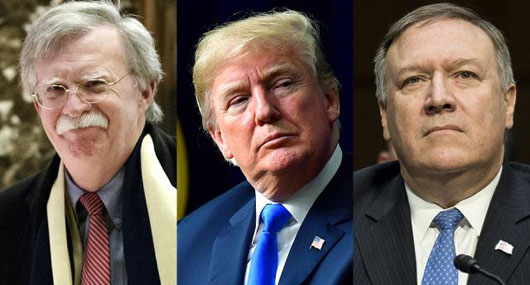by WorldTribune Staff, March 25, 2018
The Trump administration’s foreign policy successes have been accomplished “because” of President Donald Trump, “not in spite of him,” as many of his mainstream media critics claim, an analyst wrote.
And, now, with John Bolton as his new national security adviser, and Mike Pompeo nominated as secretary of state, Trump has in place a team that will not try to moderate his foreign policy strategy, but implement it, James S. Robbins wrote for USA Today on March 23. The two appointments, announced after the news of an upcoming Trump summit with North Korean dictator Kim Jong-Un has shocked the president’s many Washington critics.

Robbins, Senior Fellow for National Security Affairs at the American Foreign Policy Council, is a former Washington Times national security editorial writer and the author of “This Time We Win: Revisiting the Tet Offensive”. He argued in his column that Trump has been successful thus far in foreign policy despite resistance from Washington’s security establishment.
Bolton now has an opportunity to impose “real personnel change at the NSC,” Michael Ledeen, an analyst for the Foundation for Defense of Democracies wrote for Front Page Mag on March 23.
“His predecessor had a baffling sympathy for NSC staffers who had faithfully served in the Obama Administration, and actually told his employees that there was no such thing as a ‘holdover,’ only loyal staffers.”
“Bolton knows better, as any grownup should. Personnel is policy, and to date the greatest failure of the Trumpists is an ongoing failure to staff out the government with their own people,” Ledeen wrote. “The Bolton move suggests that the president is at least beginning to recognize this, and it would be confirmed by a substantial facelift to the NSC staff. Apparently Trump and Bolton have had many discussions about this operation, so the new national security adviser will no doubt have a very clear picture of his powers, as well as the policies the president wants articulated and executed.”
“The established narrative from the president’s critics has been that President Trump lacks the knowledge, experience and temperament to successfully manage America’s national security affairs,” Robbins wrote.
“By this reasoning he had to be surrounded by an ‘axis of adults’ to restrain his impulsiveness, lest the U.S. blunder into global conflict based on a stray Tweet or sudden tantrum.”
When H.R. McMaster was appointed to replace Michael Flynn as national security adviser in 2017, a New York Times column praised him as a “stabilizing force” to balance out “the hot heads who occupy Mr. Trump’s inner circle.”
With McMaster’s departure, the Times says, “if President Trump wanted a national security adviser who would match his blunt, hard-edge, confrontational approach to the world, then Mr. Bolton fits the bill.”
Robbins noted that “The recent leadership switch at the State Department from moderate Rex Tillerson to more hawkish CIA Director Mike Pompeo was also framed as a potentially destabilizing move towards enabling Trump to be Trump.”
But Trump’s “’ blunt, hard edge’ style is better suited for the dangerous world we live in than the cool detachment of Obama-era ‘leading from behind,’ ” Robbins wrote. “And if President Trump has disrupted the old way of doing things, it is only because the status quo was failing. He is winning in ways the old model would never have predicted.”
Trump’s “bold approach to combating the Islamic State – which Bolton also supported – virtually destroyed their self-proclaimed Caliphate over the course of a single year,” Robbins noted. “We knew his strategy was particularly successful when the president’s critics and former White House administration officials rushed to claim that it was the Obama team’s plan all along.”
Robbins continued: “But if it was their plan, why did President Obama fail with it and Trump succeed? The question answers itself. On the nuclear agreement with Iran, which Trump has called ‘the worst deal ever,’ the president’s new team members will be in place in time to formulate a strategy for the required waiver review in May, which may spell the deal’s doom.”
The president’s critics opined that Trump’s “tough, almost contemptuous exchanges with ‘Rocket Man’ Kim Jong-Un, and veiled threats of pre-emptive military strikes might lead to devastating conflict. Yet instead of going to war, Kim reached out to the president, saying he is ‘committed to denuclearization.’ ”
Trump and Kim will meet in May, another diplomatic first.
Subscribe to Geostrategy-Direct __________ Support Free Press Foundation
